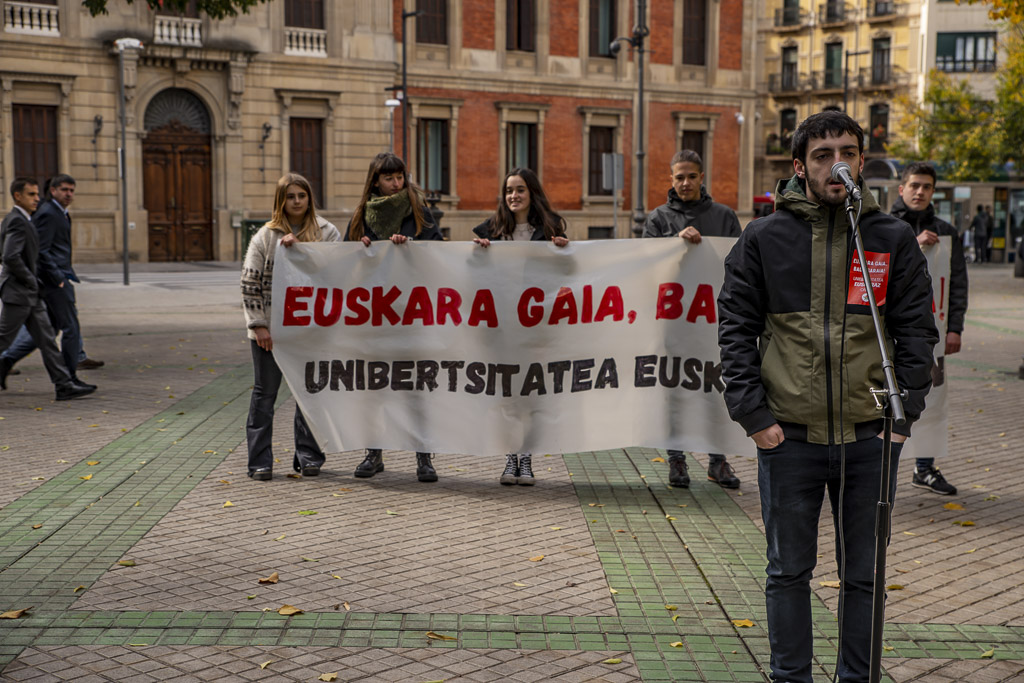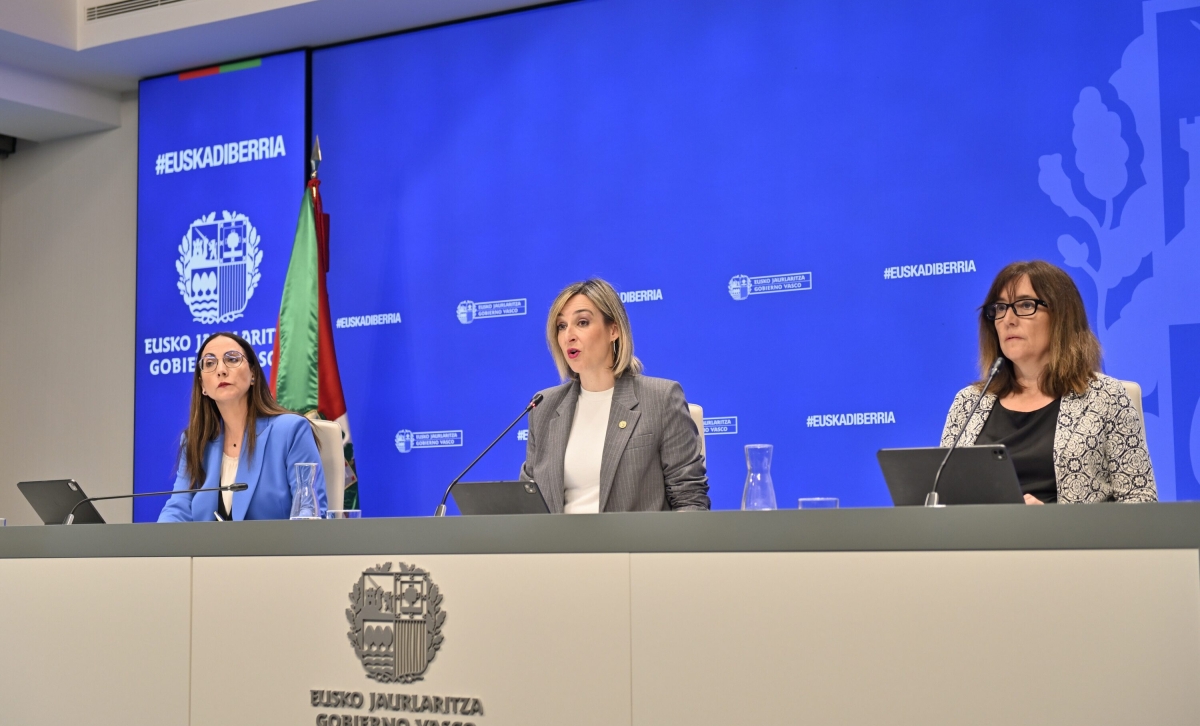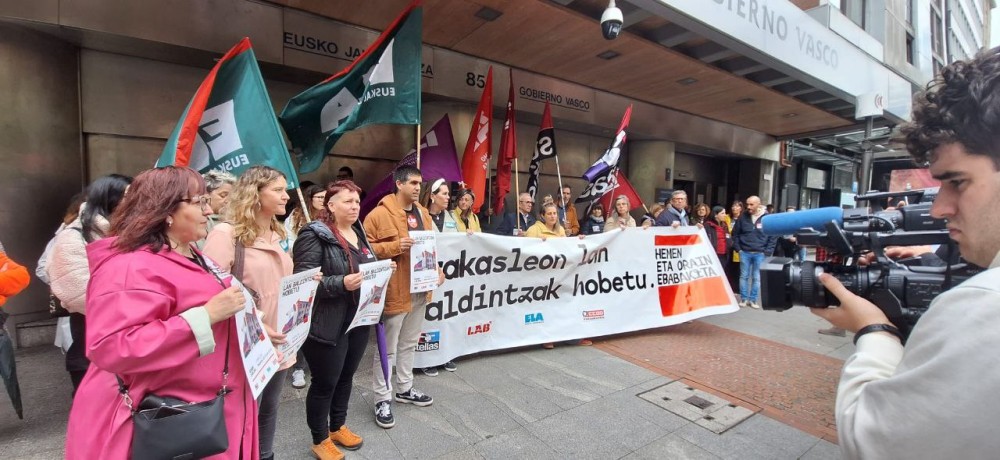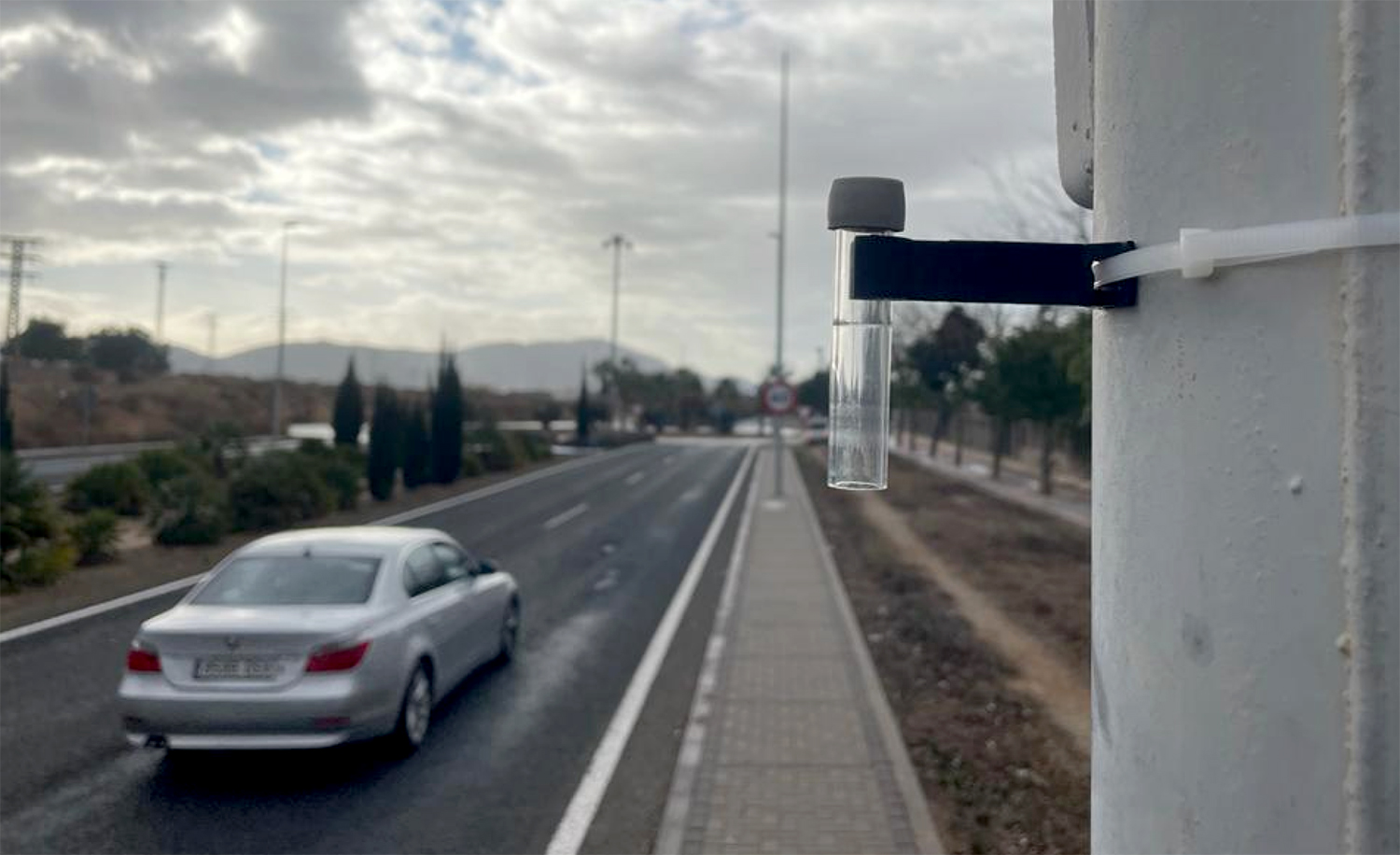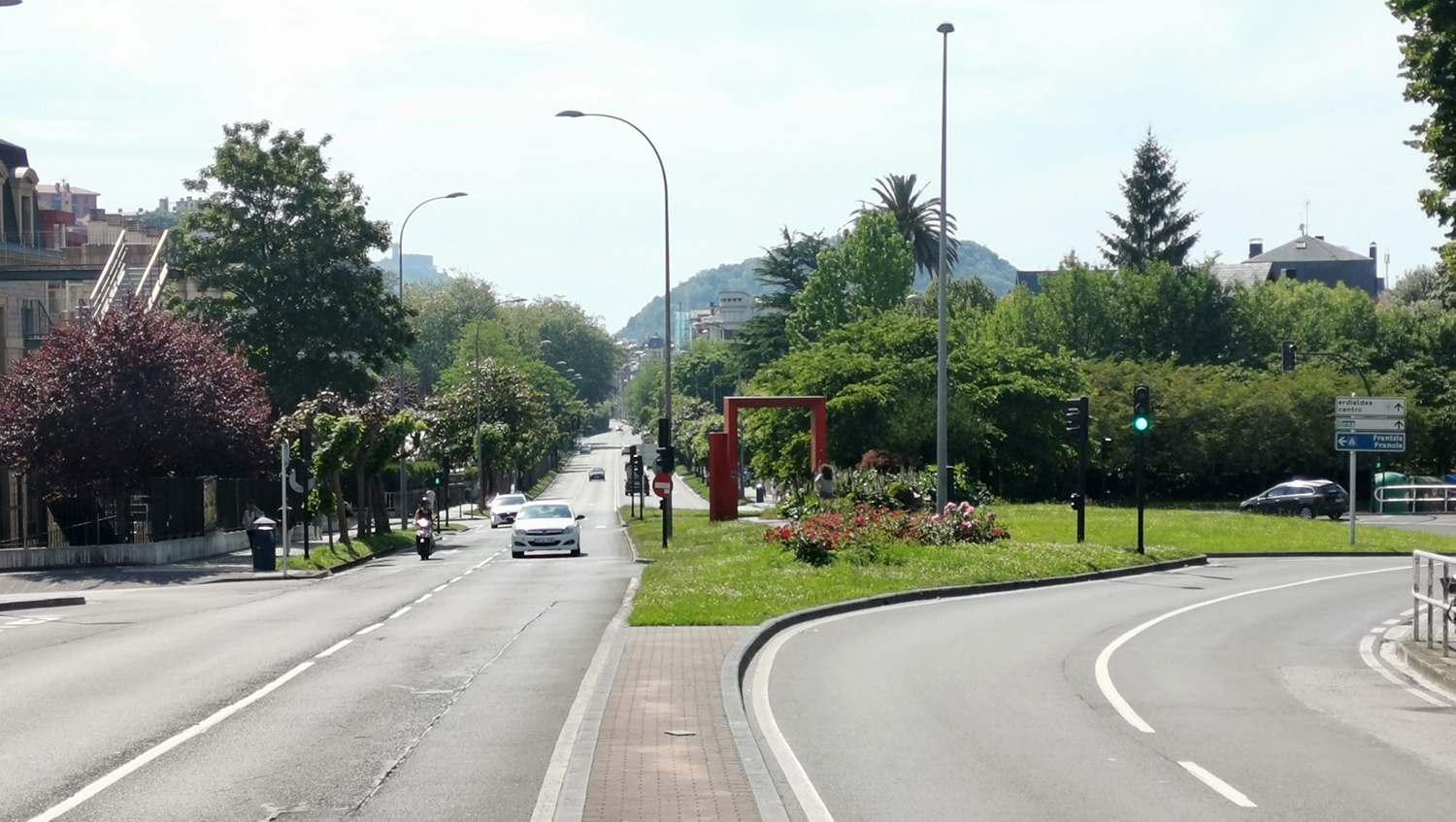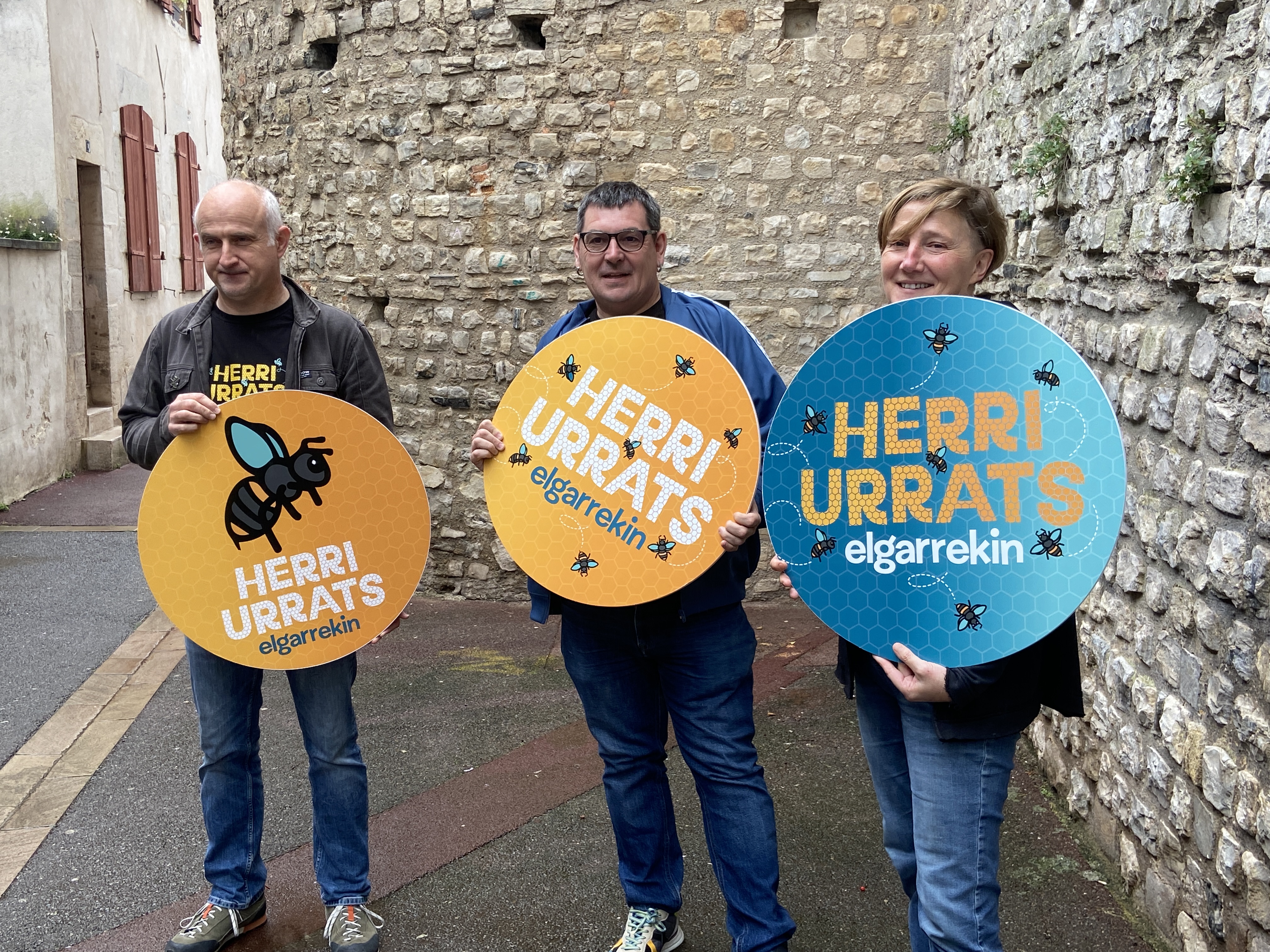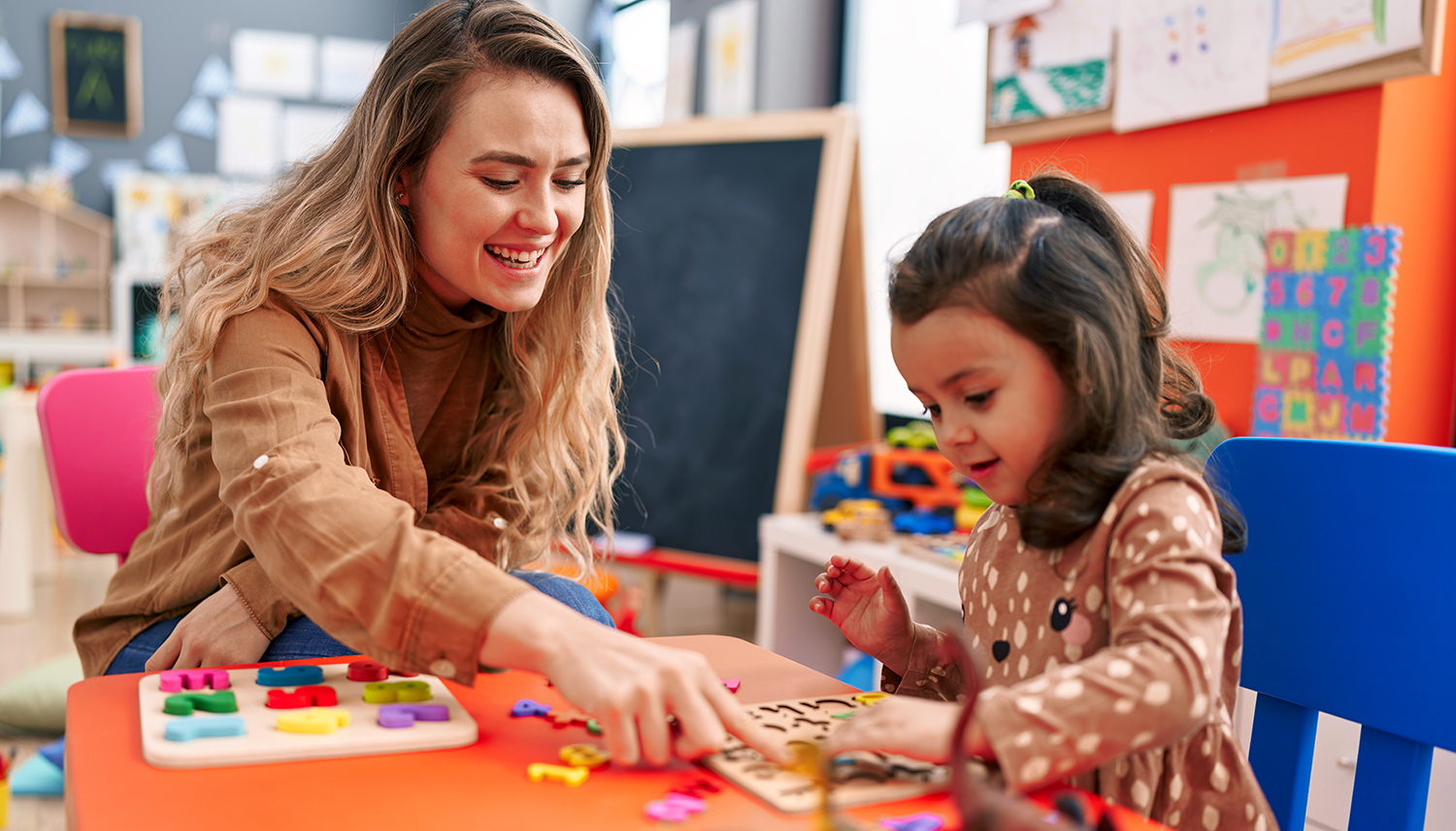In these centers they evaluate without enemies
- More and more educational centers abandon the traditional scheme of exams and notes and work an educational evaluation that takes into account the integral development of students. We have asked four of them to tell us their experience: Public Working College, Ikastola San Bizente, Small School of Arrankudiaga and Free School Geroa.

In the template, “business”
The public center of Hernani has 727 students of Early Childhood and Primary Education, which will soon be 50 years old and since its creation have based their evaluation on the student's development process. “Taking development as a whole requires taking into account not only the contents but also the attitude, the relationships, the creativity, the ability to face the difficulties…”, explains Director Ixabel Arin and Head of Studies Ana Quevedo. The evaluation is not a one-time measurement, but a continuous measurement, but the process of each one goes daily, taking into account that the starting point of each student is different from the situations: How is the student in a group and individually? What material has it used and what proposals has it made? Have you tried it? What are your working habits and interests? How does it relate to adults and equals? What responsibilities? To what extent?... Through observation, the teacher will fill out items and take notes, and then the team of teachers will meet to gather everyone's vision.
They work by units or by themes based on three questions: What do we know (before)? What do we want to know? What have we achieved (after working on the subject)? They perform “Work Businesses” at the beginning of each topic: what they are going to work with and with what objectives, so that the student knows what needs to be achieved in the end. In the end there is always a production: it can be to explain to others what has been worked, to the parents, or a written work… and “the key is that this last production is not experienced by the students as a control, but as a way to end everything worked”. This production has a second important part: nothing is perfect, and together with the young man the professor will work on how to improve and complete what he has done. “The idea is that the student has a sense of accomplishment and that each one advances to their level. Some students who can't work like others, and that's also a process that needs to be worked on, because they need our help, but help is always to feel good and be a success to others. Everyone has to come to the end: everyone will make the recipe, the story or whatever, each according to their process.” They put the emphasis on the student's skills, because it's more motivating, and in areas where there are difficulties, instead of raising them as difficulties, they see how to move forward together. “However, we also have to work the frustration: we are not good at everything and we have to realize to work those voids.”
I. Arin and A. Quevedo, Employee: "The key is that this latest production has not become a control of students. The idea is that the student has a sense of accomplishment and that each one advances to his/her level"
Added to all this are self-evaluation and co-evaluation (the student evaluates the following) and “the teachers also evaluate us”. Pupils and families do not receive notes, but an overall assessment that includes, in addition to the content, the many areas mentioned at the beginning. The assessment will be completed by adding the family's opinion and depending on the student's needs, they will contact autonomy, mathematics...
Asked about external evaluations, we have been told that they take away the fears students may have, “but we do not give them importance and we are clear that they will not condition our activity, since these tests do not respond to the daily dynamics”.
Saint Vincent, variables 1, 2 and 3
At ikastola San Bizente de Oyón, five years ago they began to apply the formative evaluation in Primary, as explained to us by the director Gema Berzal: “We detected two main deficiencies: on the one hand, the students did not understand very well what they had to do with the exercises and for what, and the new model has helped us to improve communication, to establish criteria, so that the students know at every moment what they are doing and at what moment they are. On the other hand, we lacked a strategic line of education and now we are clear what and what we are doing for.” Each month the faculty designs the cooperative dynamics, the project or the action that will be carried out in that month, and following a protocol they will observe the activity, the professor, the group and the students. In daily life, everything is a test, either orally, written or not, because the tests are not related to the artificial quarterly deadlines or the needs of the note, but with what the rhythm requires: “We’re getting evidence of where the student was, what path to follow and where he is now. The key is to ask effective questions: Do you agree with what you say? What new proposals would you make? What's the point of what you're doing? How do you know you're doing well?... And if you get stuck in the answers, we'll help you unlock the knot: Have you taken this step and this one? Thus, students internalize metacognition, become aware of their learning process and knowledge, know where to look at each moment”. The last question of the protocol also wants to help in learning: If I had to do it again, what would change?
Dr. G. Berzal, San Vicente: "Students internalize metacognition, that is, they become aware of their learning process and their knowledge, know where to look at all times"
In Saint Vincent there are two fundamental pillars: autonomy and critical opinion. In general, they evaluate capabilities, but how to ensure that they have also internalized conceptual content? “As we work: for example, if we talk about types of energy, we will pull out the ‘exit card’ and ask first what energy is, we will explain and make sure that everyone has understood it, because without fixing the base or concept we will not be able to move forward. In a way, it is a permanent evaluation, carried out instantly; it is not later an extraordinary test to ask about this content.”
The grades have been devalued, so students do not focus on it, but they have three variables:
- 1, in the light of the evidence, has not achieved the objective and will set the direction.
- 2, you have succeeded.
- 3, he has done very well.
“It’s not the end result, it’s the process. We have to go from 1 to 2, from 2 to 3, and we will put an additional challenge to 3, because the number is not an objective, but a tool to move forward.”
.jpg)
In Arrankudiaga, awareness of our own development
In the small school in Arrankudiaga, 114 students between the ages of 2 and 12 work and, following the philosophy of these schools, there are children of different ages in all groups. For ten or fifteen years they have been working on projects, without textbooks and based on the attention to diversity. A reflection of this methodology is also the evaluation: “It’s a resource that shows us what planning we’re going to do with the student and what we can help: this information tells us when the child’s knowledge is, what interests they have, what strategies they use, what they know about the subject, how they manage the situations they face...”, says Director Nekane Otsoa. In addition to observing the academic environment and the competences, “we want to know if the student is comfortable and for this we need to know the context. It is essential, for example, to evaluate the attitude and the situation that the student encourages, which will greatly condition his/her learning process”.
N. Lobo, Arrankudiaga: "If you give parents a narrative of the trajectory that the student has had, they can misinterpret it if it does not reflect where it is with the general objectives"
There are no studies, the students make productions and the teacher is recording the journey. If you have seen a change, it will be written, the context in which it has occurred, the reasons that may exist for it, “and it may be that you have had a good/bad morning before coming to school.” To complete the focus, the team of classroom educators and educators meets weekly. With all this, the teacher will issue a quarterly report detailing the itinerary of the student. “And at the end of the report we also put the note: we didn’t do it before, but we realized that in some houses there were misunderstandings. If you just give a narrative of the trajectory and the progress made by the student, they can misinterpret it, perhaps because the student is well taking his/her own path as a reference, but that does not have to reflect where he/she is with the general objectives”. In any case, Otsoa has made it clear that they give strength to the students' own trajectory. “We often teach boys and girls the information we are receiving, because we collect it from young people to learn about its evolution, because many times we are not able to see the route when we are so stuck in the process, it seems that we have always been and will be very good or very clumsy, and it serves to break labels: ‘Look what you’ve achieved,’ or do you think you can improve?’ we’ll ask.
The reciprocal evaluation of students is also beneficial: “Suppose that more than one colleague or colleague has told you on several occasions that they cannot read your writing because they do not understand the letter; it is more effective than saying that the teacher or teacher that you have to improve the letter, because if you want your colleagues and colleagues to read your texts you will feel the need to work the writing, you will see the sense of participating with that objective in the Improvement Workshops. In these workshops, students are enrolled in the activity they want, depending on the difficulties they observe.”
.jpg)
In the future, respect as a basis
The Geroa Free School in Trokoniz has more than 100 students between 2 and 16 years of age from Early Childhood Education to High School, taking as a starting point the Waldorf pedagogy. “The first step to evaluate is to know the child well, to know where he is and what he needs at every moment and stage, so he can maintain his enthusiasm and his passion for learning, both at school and outside it,” says Professor Ainitze Balenziaga. To meet the child, the great advantage is that they work with the same teacher from 6 to 12 years of age.
“When they come to school we give them our hand and then we have to read, to know in what mood they have come: if they have tightened my hand, or the greeting they have escaped, if they have looked at me… I will start the class and look at the body, and I will put the question about what I have worked in the previous class; I will see in function of those who have raised their hand the passion to answer, who does not get involved. Also part of the observation is the assessment of the attitude, practice and class of the professor.
A.Balenziaga, Geroa: "What is going to be said to the student has weight; if it is given badly, one can create fears, limits that put oneself in. The message must serve to advance; if it is invented, the student will follow the challenge"
They aim at individual, continuous, stable and respectful evaluation. “There are no notes or analysis, because this is not a quantitative assessment, but a qualitative one. In the report we do at the end of the year we will write about how it was at the beginning, what virtues it has developed and what its obstacles and challenges have been, what we are encouraged to work on… About reality, but with a positive perspective, because we always have to give a door to move forward.” And the difficulties? “If the child has problems in mathematics, we cannot stay there, we must highlight his qualities and his lights in other areas. At the same time, we can express the efforts that we can make in mathematics, but with a lot of responsibility and respect, because we are an important reference for him and because what we say weighs; if we do it badly, we can generate fears, limits that will impose on ourselves, according to the judgments received. The message should be used to advance, and if it is successful, without tagging anyone, the student will receive it well, will want to keep the challenge. In addition, if you have difficulties, you can come up with tools, or to a certain point, and very well, if that is what you can bring. Knowing what the starting point, the process and how far each can go with its challenges!”
We've also talked about relativizing evaluation. In short, students are being evaluated for certain abilities, not their value as people, and each one will be able to put forces. “Our mission is to accompany you in this development process, to act as a bridge, and if our gaze and instructions are useful, wonderful.”
“From the moment we qualify, the evaluation we are going to make is minimal”
LAB would like educational agents to reach a consensus on 10 criteria for a new evaluation model and work has already begun to do so. Going back to the current model, he organised a few days of educational evaluation and we have chosen four keys to everything discussed at the round table. Speakers included Ane Sofedo (UPPA, UEU), Alexander Barandiaran (HUHEZI) and Lore Erriondo (UPV).
.jpg)
Conditioned by the rating
“We believe that evaluation is natural and that at best we can think about how and what to evaluate it,” says Ane Sofedo, and the child internalizes that it should be qualified. It goes without saying what implications it has socially, considering that to qualify is to classify students. I believe that this is the main error, that evaluation is not made, but qualification, and that this conditions the full evaluation. Because, from the moment you qualify, the minimum is what evaluation you will do next, because you have to say if you will pass the course and put the note, and without questioning it, it is useless. Is everything evaluable? Yes, but you can't rate everything. Sometimes we get obsessed with whether objective evaluation is possible, without realizing that we are looking for objectivity: if we have to qualify, let it be as objective as possible. When we do not qualify it, the observation is not objective, how it will be objective! I will observe a situation of who I am and what I am aware of.”
External evaluations and claim of the trap
Lore Erriondo makes it clear: “By the time studies like PISA have been created, they have to be placed. We cannot take them into account at the center as a tool for our internal evaluation.” Neither does Alexander Barandiaran, “but when the external evaluation is for contrast, I think it is necessary. When you're inside, you don't see many things, and it's interesting to look at someone who's out of the system for contrast." Sofedo has underlined that the educational model of the countries that achieve good results in PISA has more weight than we consider here alternative: “That is, when quality education is offered, whether regulated or not, children learn no less than others.” Sofedo has also advocated for wedge and finding slits to avoid as much as possible what the state offers us: “For the sake of the child and the student, we must face the system.” Barandiaran, in the same opinion, encourages educators to cheat: “We have to introduce contradictions into the system, and if the system forces us to rate it, we can put a good rating on everyone and then do what we want. And what do we want? What everyone wants: to be happy. Let’s be happy in schools, because in the group that is satisfied development will be given.”
.jpg)
To what extent is the child's participation good?
Sofedo has defended the participation of students, but has insisted on the risk that children will be evaluated according to the parameters that the teacher puts: “I agree with the meetings between teachers and students to discuss life or what is learned in the center, but as far as evaluation is concerned, lately there is a tendency to involve the child in their process, and in theory it is OK, if the child understands where this evaluation is made, because he knows what he does well and what is wrong, but he does not live in the wrong way, until he is told that he is poor. Agreeing the evaluation with the student runs the risk that the student will become his/her own police; if the teacher has to qualify him/her, the teacher will put a 5, the student will not put that 5 into himself/herself”. In Olite's view, we often overprotect and underestimate children and young people, who are able to evaluate their trajectory. BARANDIARAN added that when we give the student the floor to evaluate him “I do not know if we tell him to also evaluate the attitude of the professor with him, if his desires and rhythms have been respected, if it has served for something… If not, let’s go to the usual, to repeat the usual in another way, focusing only on the students and not on the environment”.
In order to complete the spider web
OLITE encourages educators to form networks between schools: “We should create Amarauna, share the experiences and tools of each other, know what the other does, agree, define, show and see what serves each other… We lack an analysis of the evaluation systems used in the educational centers of Euskal Herria, and it seems very important, to stimulate and interact, to organize our own education, and also to be aware of everything we are doing.”
The Department of Education reported on diagnostic evaluations in February: He talked about the mid-stage of 2023 and the end-stage of 2024. Since the disastrous results would show that we have a structural problem, the department decided to comply with the procedure (publish... [+]
I found the old news on the LIGHT ephemeris channel: On April 23, 1918, Irish workers went on a general strike in I. Against forced recruitment for World War II. Thanks to the response of the workers and independence supporters, Britain was forced to retreat.
We don’t have to... [+]














